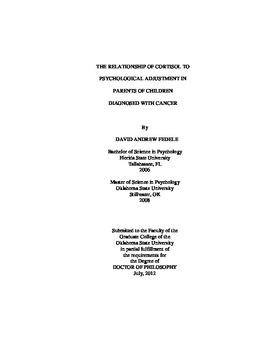| dc.contributor.advisor | Mullins, Larry Lee | |
| dc.contributor.author | Fedele, David Andrew | |
| dc.date.accessioned | 2013-11-26T08:27:39Z | |
| dc.date.available | 2013-11-26T08:27:39Z | |
| dc.date.issued | 2012-07 | |
| dc.identifier.uri | https://hdl.handle.net/11244/6942 | |
| dc.description.abstract | Scope and Method of Study: The current study examined the relation of physiological stress as measured by salivary cortisol in a sample of parents of children who had been diagnosed and receiving treatment for pediatric cancer for at least six months (n = 43). Specifically, the study examined baseline levels of salivary cortisol in parents of children with cancer and the relationship of salivary cortisol to levels of parental uncertainty, perceived barriers to care, parenting stress and social support in an effort to delineate specific parental constructs that are related to physiological stress. Participants were recruited from a large teaching hospital in the Midwest and provided one saliva sample during a visit to the hospital. All participants were screened for factors known to influence cortisol (e.g., recent food, caffeine, nicotine, and sleep) prior to collection. Parents completed the Parental Perceptions of Uncertainty Scale, Barrier to Care Questionnaire, Parenting Stress Index - Short Form, and Multidimensional Scale of Social Support. | |
| dc.description.abstract | Findings and Conclusions: Consistent with hypotheses, parents of children who are receiving treatment for pediatric cancer evidenced low salivary cortisol levels. Parental salivary cortisol levels appeared to be lower than previous studies that investigated cortisol in parents of children with cancer. Additionally, the salivary cortisol levels found in the current study appeared to be toward the lower end of normative expected salivary cortisol levels in healthy adults. Salivary cortisol was also found to not be a significant predictor of parenting stress, perceived barriers to care, parental uncertainty, or social support. Moreover, salivary cortisol levels were not correlated with any of the measured demographic or illness variables. Finally, exploratory analyses revealed that although salivary cortisol was unrelated to any of the parental constructs, parenting stress was found to be a significant predictor of illness uncertainty. The current study is limited by study design and a small sample. Therefore, it is challenging to ascertain whether the lower than expected salivary cortisol levels are reflective of dysregulation of the hypothalamus-pituitary-adrenal axis or that parents of children receiving treatment for cancer are not experiencing enhanced physiological stress. | |
| dc.format | application/pdf | |
| dc.language | en_US | |
| dc.rights | Copyright is held by the author who has granted the Oklahoma State University Library the non-exclusive right to share this material in its institutional repository. Contact Digital Library Services at lib-dls@okstate.edu or 405-744-9161 for the permission policy on the use, reproduction or distribution of this material. | |
| dc.title | Relationship of cortisol to psychological adjustment in parents of children diagnosed with cancer | |
| dc.contributor.committeeMember | Chaney, John M. | |
| dc.contributor.committeeMember | Page, Melanie C. | |
| dc.contributor.committeeMember | Byrd-Craven, Jennifer | |
| dc.contributor.committeeMember | Winterowd, Carrie | |
| osu.filename | Department of Psychology_20.pdf | |
| osu.accesstype | Open Access | |
| dc.type.genre | Dissertation | |
| dc.type.material | Text | |
| dc.subject.keywords | adjustment | |
| dc.subject.keywords | cancer | |
| dc.subject.keywords | cortisol | |
| dc.subject.keywords | family | |
| dc.subject.keywords | parent | |
| thesis.degree.discipline | Psychology | |
| thesis.degree.grantor | Oklahoma State University | |
